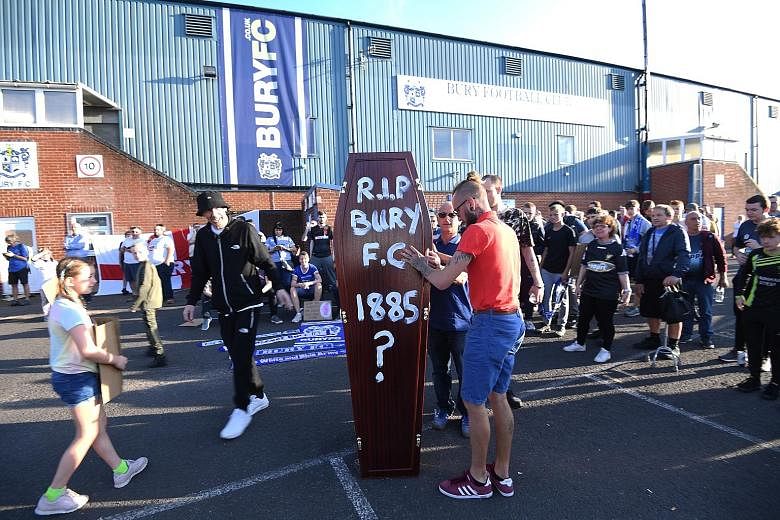LONDON • There was a heartwarming sight of fans young and old sprucing up Bury's Gigg Lane ground in the hope of a match this Saturday.
But optimism soon ended in despair as the 134-year-old third-tier team, one of England's oldest football clubs, was expelled from the Football League on Tuesday for failing to resolve their financial problems or find a new buyer.
After a takeover bid fell apart just hours before a 5pm local deadline, the Football League (EFL) ended the North West club's 125-year membership of the world's oldest professional football league.
The writing had been on the wall for Bury after a roller coaster of a day for fans and employees alike, when data analytics company C&N Sporting Risk withdrew their takeover offer to Steve Dale, who had bought the club last December for a single pound.
It was, said EFL executive chairman Debbie Jevans, "one of the darkest days" of the league.
The same could be said of the north-west town which will now be without a club.
With the EFL already explaining how their decision would impact the fixtures list and relegation places, the only way back for Bury looks to be through a new club working its way up from the semi-professional "non-league" structure.
While questions will be asked over the role of Bury owner Dale, his predecessor Stewart Day and the club's finances, the disappearance of a club with such a long history also raises broader questions about the state of English football.
At the same time as announcing the end of Bury as a professional club, the EFL gave Bolton Wanderers, another north-west club with an even more illustrious past, two weeks to complete a sale to a new owner or face the same fate. No club had been expelled from the league for 27 years since Maidstone in 1992 but there is now the risk of a second such exit in just 14 days.
The North West is one of England's traditional football heartlands and Bury is less than 25km from the stadiums of two of the richest clubs in the world - Manchester United and Manchester City.
From the unrivalled wealth of the Premier League to the modest fourth-tier League Two, England is unique in having 92 fully professional clubs in four divisions.
But some have questioned whether the search for the promised land of Premier League riches is undermining sensible management of lower league clubs.
Andy Holt, chairman of Accrington Stanley, who slowly climbed back into the professional game 44 years after financial trouble saw them fall out of the Football League in 1962, said there are money troubles across all the divisions below the Premier League.
"They are losing fortunes in the Championship, £400 million (S$678 million) a year. You can go down the list, clubs losing absolute fortunes," he said recently.
"We have got to be able to get our house in order, the amount of clubs that are up for sale tell me how much they are losing, year in year out, and they can't find a way out."
REUTERS, AGENCE FRANCE-PRESSE

